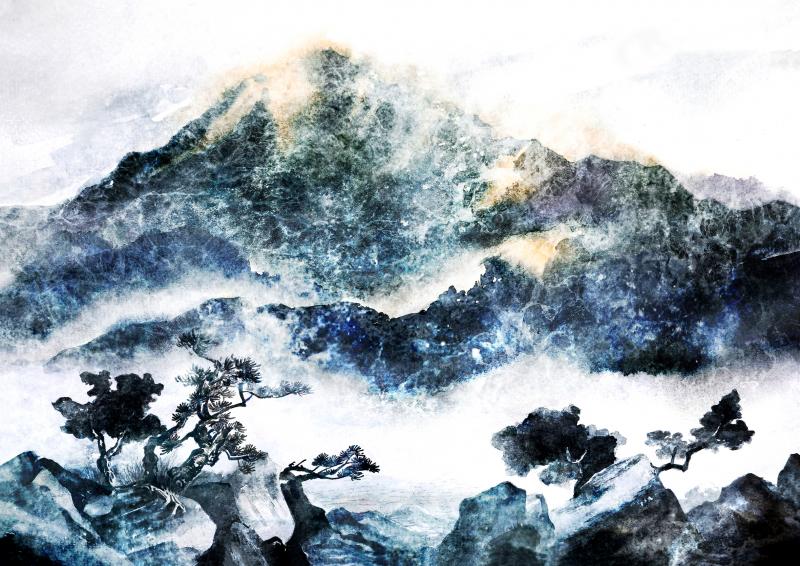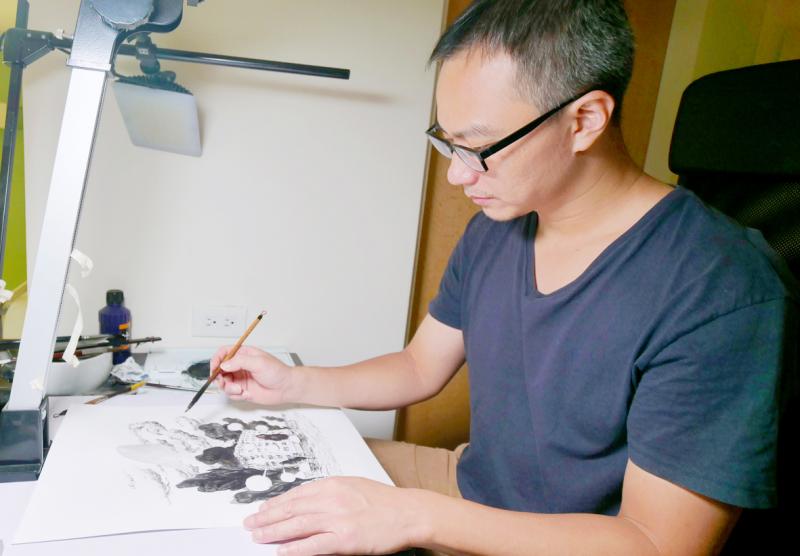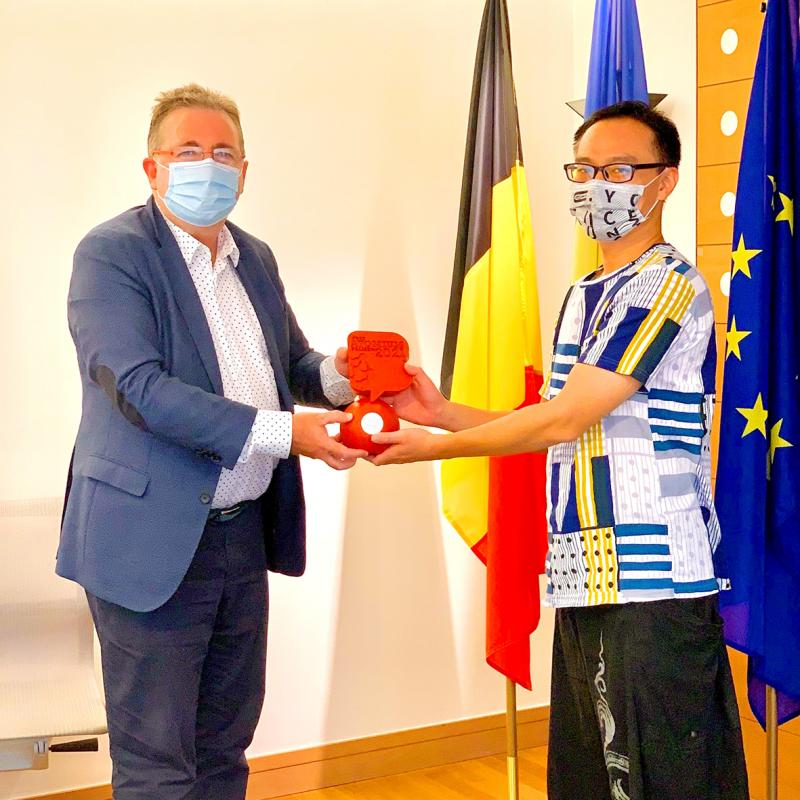Wu Shih-hung (吳識鴻) isn’t an avid reader of comics or Taiwanese literature.
An animator by trade, Wu first became involved with Fisfisa Media (目宿媒體) through its acclaimed documentary series on Taiwanese writers, contributing his distinct ink brush-style artwork to the 2011 feature on Wang Wen-hsing (王文興), The Man behind the Book (尋找背海的人).
“When I first joined the company, people were talking about how good the animations in The Man behind the Book were,” editor of Fisfisa’s comic division Lee Pei-chih (李佩芝) says. “Every new employee had to watch it.”

Photo courtesy of Fisfisa Media
When Fisfisa decided to launch its long-discussed comic venture featuring acclaimed poet Yang Mu’s (楊牧) coming-of-age essay collection Storms over Hills and Ocean as one of the first subjects, Wu was recommended despite having no experience with comics and having never read Yang’s work.
“I only drew comics as a kid,” Wu says. “But animators also have to make storyboards, and I felt that the process should be quite similar to making comics. So I decided to give it a shot.”
The resulting piece won the prestigious Belgium-based Raymond Leblanc Prize last month, which in addition to cash rewards provides the opportunity for Fisfisa to work with world-class Belgian comic editors to refine its final product. Both Chinese and French versions of the comic will be released next September to coincide with the popular Comic Strip Festival in Brussels.

Photo courtesy of Fisfisa Media
“It was a unanimous decision for all of us,” says Gauthier van Meerbeeck, awards judge and editorial director of Belgian comic publisher Le Lombard, which will be handling the comic’s French edition. “We’ll just be working on the editing, we have little to say about his artwork.”
COMIC INTERPRETATIONS
Lee says Fisfisa planned on producing both documentaries and comics since its inception in 2009, but due to various obstacles they didn’t start the comic side until 2019. They started with 32 short pieces by acclaimed artists, and the first two book-length pieces were set for Yang’s autobiographical essays and Chu Tian-hsin’s (朱天心) The Hunters (獵人們).

Photo courtesy of Fisfisa Media
The two mediums offer different storytelling opportunities, as documentaries are more suited to exploring the author’s life, while comics offer more creative leeway to interpret the author’s works. Yang Mu’s essays, which are available in English under Columbia University Press’s Memories of Mount Qilai, were a top priority for such treatment for Fisfisa since its early days. The comic version of The Hunters was released in July.
Lee says they tried interviewing an author for a short comic once, but it didn’t pan out as well.
“The editors told us that there’s too much information and we were too affected by that interview,” Lee says. “They wanted us to feel the work emotionally, and to really think about what the author is trying to express.”
There was no chance to speak to Yang anyway, as he died in March of last year at the age of 80, two months before Fisfisa approached Wu.
Wu says his unfamiliarity with Yang’s work actually helped him to take a more objective approach to the original material while making the comic.
“I’m not a fan of literature, so I don’t see Yang as an idol or anything,” he says. “I didn’t feel that his work was inviolable. So I relied on my training as an animator to organize the piece purely based on storytelling. Perhaps, because of this, I didn’t really struggle with how authentic the final product was to the original. As an outsider, I don’t have these concerns.”
Wu’s mission was to depict Yang’s coming-of-age story and why he decided to pursue a literary career, focusing on the last chapter of the book.
“There wasn’t much of a plot in that chapter, it was mostly his reflections,” Wu says. “So I had to cram a lot of story elements into it to tell a full tale. I read the whole book and took suitable bits and pieces from it to enrich the piece.”
INTERPRETING A CLASSIC
Lee says they hired a literary consultant to explain Yang’s works so that the artist and publisher were on the same page.
“We wanted to make sure that there were no misinterpretations,” Lee says. “That way we can give the creator more freedom. Yang’s work jumps around a lot, and Wu came up with his own ways to transition between them; this sort of interpretation is quite exciting. I feel like it wouldn’t have been as good if he just completely followed the book.”
Wu says Yang’s work is quite accessible even without fully understanding it, and he was able to plot out a story without much difficulty.
“I made note of all the relevant events in the book, and then I went through them one by one to see which should be used for foreshadowing, which should be used for the climax, which parts I need to embellish … it’s just like editing a film,” Wu says.
Lee highlighted the passages that Wu used in an English-version of the book and sent them to the jurors, who were quite impressed. In fact, jury president Loo Hui Phang liked them so much that she volunteered to finalize the translation herself, asking a Taiwanese friend to translate the work into rudimentary French for her to refine.
Van Meerbeeck says the judges loved Wu’s artwork, but they’d never heard of Yang Mu, nor were they familiar with Taiwanese history.
“They asked why there were Japanese-style buildings in Taiwan, and were generally quite curious about the historical background,” Wu says. “They think that I need to spend more time explaining this part. We in Taiwan take this knowledge for granted, but it is very interesting to them.”
Contrary to what people might believe, Europeans seem to be quite accepting of comics from places they don’t know much about. Judge Frederic Ronsse praised Wu’s artwork rooted in Eastern traditions, but most importantly, “he’s depicting stories from his homeland, and just that one aspect will pique the interest of European readers,” he says.

Taiwan Power Co (Taipower, 台電) and the New Taipei City Government in May last year agreed to allow the activation of a spent fuel storage facility for the Jinshan Nuclear Power Plant in Shihmen District (石門). The deal ended eleven years of legal wrangling. According to the Taipower announcement, the city government engaged in repeated delays, failing to approve water and soil conservation plans. Taipower said at the time that plans for another dry storage facility for the Guosheng Nuclear Power Plant in New Taipei City’s Wanli District (萬里) remained stuck in legal limbo. Later that year an agreement was reached

What does the Taiwan People’s Party (TPP) in the Huang Kuo-chang (黃國昌) era stand for? What sets it apart from their allies, the Chinese Nationalist Party (KMT)? With some shifts in tone and emphasis, the KMT’s stances have not changed significantly since the late 2000s and the era of former president Ma Ying-jeou (馬英九). The Democratic Progressive Party’s (DPP) current platform formed in the mid-2010s under the guidance of Tsai Ing-wen (蔡英文), and current President William Lai (賴清德) campaigned on continuity. Though their ideological stances may be a bit stale, they have the advantage of being broadly understood by the voters.

In a high-rise office building in Taipei’s government district, the primary agency for maintaining links to Thailand’s 108 Yunnan villages — which are home to a population of around 200,000 descendants of the Chinese Nationalist Party (KMT) armies stranded in Thailand following the Chinese Civil War — is the Overseas Community Affairs Council (OCAC). Established in China in 1926, the OCAC was born of a mandate to support Chinese education, culture and economic development in far flung Chinese diaspora communities, which, especially in southeast Asia, had underwritten the military insurgencies against the Qing Dynasty that led to the founding of

Artifacts found at archeological sites in France and Spain along the Bay of Biscay shoreline show that humans have been crafting tools from whale bones since more than 20,000 years ago, illustrating anew the resourcefulness of prehistoric people. The tools, primarily hunting implements such as projectile points, were fashioned from the bones of at least five species of large whales, the researchers said. Bones from sperm whales were the most abundant, followed by fin whales, gray whales, right or bowhead whales — two species indistinguishable with the analytical method used in the study — and blue whales. With seafaring capabilities by humans